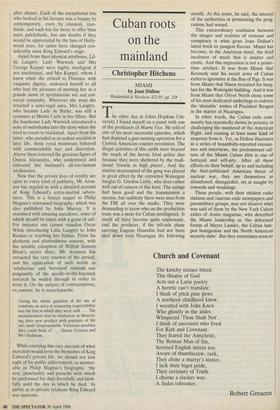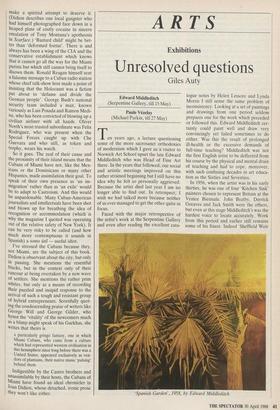Cuban roots on the mainland
Christopher Hitchens
MIAMI by Joan Didion
Weidenfeld & Nicolson, £12.95, pp. 238
The other day at Johns Hopkins Uni- versity I found myself on a panel with one of the producers of Miami Vice. He told of one of his most successful episodes, which had depicted a gun-running operation for a Central American counter-revolution. The illegal activities of this outfit were beyond the reach of the heroic local police duo because they were sheltered by the tradi- tional 'friends in high places'. And the sinister mastermind of the gang was played to great effect by the convicted Watergate burglar G. Gordon Liddy, who does rather well out of cameos of this kind. The ratings had been good and the transmission a success, but suddenly there were men from the FBI all over the studio. They were demanding to know who on the production team was a mole for Cuban intelligence. It could all have become quite unpleasant, said the producer, if the tell-tale plane carrying Eugene Hasenfus had not been shot down over Nicaragua the following
month. At this point, he said, the interest of the authorities in persecuting the prog- ramme had waned.
This extraordinary confusion between the images and realities of violence and conspiracy is what gives Joan Didion's latest book its pungent flavour. Miami has become, in the American mind, the fetid incubator of much that is sinister and exotic. And this impression is not a prime- time artefact. It was from Miami that Kennedy sent his secret army of Cuban exiles to ignominy at the Bay of Pigs. It was from Miami that Nixon recruited his burg- lars for the Watergate building. And it was from Miami that Oliver North chose some of his most dedicated underlings to enforce the 'deniable' wishes of President Reagan in the matter of Nicaragua.
In other words, the Cuban exile com- munity has repeatedly shown its potency in challenging the manhood of the American Right, and coaxing at least some kind of response from it. Yet, as Didion illustrates in a series of beautifully-reported encoun- ters and interviews, the predominant cul- ture of the Miami Cuban elite is one of betrayal and self-pity. After all these efforts on their behalf, up to and including the best-publicised American threat of nuclear war, they see themselves as abandoned, disregarded, set at naught by cowards and weaklings.
These people, with their strident radio stations and raucous exile newspapers and paramilitary groups, may not deserve what was said of them by the New York Cuban exiles of Areito magazine, who described the Miami leadership as 'the deformed foetus of Meyer Lansky, the Cuban lum- pen bourgeoisie and the North American security state'. But they sometimes seem to
make a spirited attempt to deserve it. (Didion describes one local gangster who had himself photographed face down in a heaped plate of costly cocaine in sincere
emulation of Tony Montana's apotheosis in Scatface.) 'Bastard child' might be bet-
ter than 'deformed foetus'. There is and always has been a wing of the CIA and the conservative establishment which knows that it cannot go all the way for the Miami purists but which still cannot bring itself to disown them. Ronald Reagan himself sent a fulsome message to a Cuban radio station whose chief talk-show host made a point of insisting that the Holocaust was a fiction put about to 'defame and divide the German people'. George Bush's national security team included a man, known variously as Luis Posada and Ramon Medi- na, who has been convicted of blowing up a civilian airliner with all hands. Oliver North's most trusted subordinate was Felix Rodriguez, who was present when the Special Forces caught up with Che Guevara and who still, as token and trophy, wears his watch.
So it goes. The zeal of their cause and the proximity of their island means that the Cubans of Miami have not, like the Mex- icans or the Dominicans or many other Hispanics, made assimilation their goal. To speak of their own presence as 'an im- migration' rather than as 'an exile' would be to adapt to Castroism. And this would be unpardonable. Many Cuban-American Journalists and intellectuals have been shot and blown up for breathing the idea of recognition or accommodation (which is why the magazine I quoted was operating out of the relative safety of New York). It
can be very risky to be called (and how much more contemptuous it sounds in Spanish) a tonto tittl — useful idiot.
I've stressed the Cubans because they, not Miami, are the subject of this book. Didion is observant about the city, but only in passing. She mentions the resentful blacks, but in the context only of their rancour at being overtaken by a new wave of settlers. She mentions the rather prim Whites, but only as a means of recording their puzzled and insipid response to the arrival of such a tough and resistant group of hybrid entrepreneurs. Scornfully quot- ing the condescending praise of writers like George Will and George Gilder, who hymn the 'vitality' of the newcomers much as a blimp might speak of his Gurkhas, she writes that theirs is
a particularly gringo fantasy, one in which Miami Cubans, who came from a culture which had represented western civilisation in this hemisphere since long before there was a United States, appeared exclusively as ven- dors of plantains, their native music 'pulsing' behind them.
Indigestible by the Castro brothers and unassimilable by their hosts, the Cubans of Miami have found an ideal chronicler in Joan Didion, whose detached, ironic prose they won't like either.



























































 Previous page
Previous page